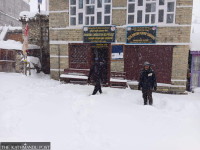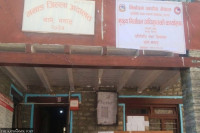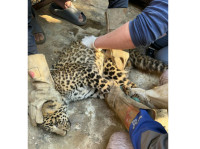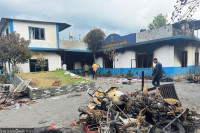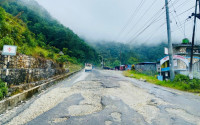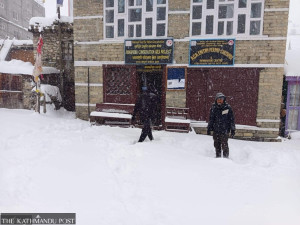Gandaki Province
Dengue and scrub typhus cases reported in Myagdi
Health workers in Myagdi have advised people to adopt preventive measures to control the spread of dengue and scrub typhus citing them as easily transmissible diseases.Ghanashyam Khadkha
Doctors at the District Hospital in Myagdi warn of a spike in dengue and scrub typhus cases with the onset of summer. The hospital recently diagnosed a teenager with both dengue and scrub typhus.
According to doctors, a 17-year-old boy from Arman in Mangala Rural Municipality was tested positive for dengue and scrub typhus. The patient was admitted to the District Hospital in Myagdi following complaints of headache, fever and joint pain four days ago.
On February 16, a 45-year-old woman from Beni was also diagnosed with dengue at the District Hospital in Myagdi
“This is the season when we see the most dengue and scrub typhus infections,” said Prakash Sharma, information officer at the hospital. Doctors said that since dengue and the novel coronavirus have some similar symptoms, patients and their families tend to panic.
“It’s important to not panic during these times,” said Sharma.
Health workers in Myagdi have advised people to adopt preventive measures to control the spread of dengue and scrub typhus, citing them as easily transmissible diseases.
Female Aedes aegypti and Albopictus mosquitoes transmit the dengue virus. The same vector also transmits chikungunya, yellow fever and Zika viruses, according to the World Health Organisation. The vectors breed in clean water and are active during the day. Uncovered water tanks and discarded plastic cups and bottles also are a breeding ground for dengue-carrying mosquitoes.
According to the WHO, the symptoms of dengue include severe muscle and joint pain, soreness in eyes, headache, constant itching and rashes. The symptoms usually occur four to 10 days after a bite from a dengue-carrying mosquito and last for two to seven days.
On the other hand, scrub typhus, also known as bush typhus, is an infectious disease that is caused by the parasite Orientia tsutsugamushi, a mite-borne bacterium, and spreads in the human body after getting bitten by infected chiggers (larval mites) found in mice. High fever, headache, abdominal pain, backache, joint and muscle pain, dull red rash, nausea and vomiting are some of the symptoms of scrub typhus infection. Patients with severe illness may start bleeding which could lead to organ failure and turn fatal if left untreated. The country saw a surge in scrub typhus cases after the 2015 earthquakes.
“Dengue cases begin to surface at the beginning of the summer season. But this year, we had our first case in February in Myagdi,” said Sanjog Timilsina, a lab technologist at the District Hospital in Myagdi.
According to the data at the District Hospital, 14 dengue cases were reported in Myagdi since mid-August 2019. All of those infected are from Beni. In January, a scrub typhus case was also identified in a 66-year-old at the same hospital.




 10.12°C Kathmandu
10.12°C Kathmandu
